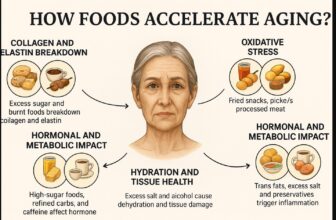Sugar is everywhere in daily meals, from your morning tea to packaged snacks and festival sweets. You may not always realize how much you’re having, but your body often asks for more. This craving isn’t just about taste. It’s tied to how your brain reacts to pleasure, how your meals are structured, and even how stressed or tired you feel.
In India, where diabetes affects more than 100 million people, sugar plays a daily role in home kitchens, tiffin boxes, and tea stalls. The issue isn’t just the obvious desserts, it’s the quiet repetition of sweet choices across the day.
This list breaks down two things: Why your body keeps asking for sugar, and how too much of it slowly damages your health.
Why You Keep Craving Sugar: 9 Reasons That Add Up
1. It Feels Good, Temporarily
Sugar stimulates your brain’s reward system. Every bite triggers dopamine, the “feel-good” chemical. That’s why you instinctively want sugar when you feel low, bored, or tired, even when you aren’t hungry.
2. It Starts in Childhood
In many Indian homes, sweets are part of festivals, rewards, and even first solid foods. You might have grown up associating sugar with love, comfort, or celebration. These early habits last.
3. Your Blood Sugar Keeps Fluctuating
Eating too many refined carbs or skipping meals can drop your blood sugar, making you feel weak or irritable. Your body asks for a quick fix, often in the form of sugar.
4. Packaged Foods Sneak It In
Sugar hides in unexpected places, bread, ketchup, breakfast cereal, “healthy” drinks, instant oats. You consume more sugar than you realize, and your brain keeps expecting more.
5. Meals That Don’t Fill You
Low-protein, low-fibre meals leave you unsatisfied. If your plate is mostly white rice or plain roti, you’re more likely to crave sweets an hour later.
6. Poor Sleep Increases Hunger
Lack of sleep alters your hunger hormones. It lowers leptin (which signals fullness) and raises ghrelin (which increases appetite), pushing you toward sugary foods the next day.
7. It Becomes a Habit
Evening chai with biscuits, a spoon of sugar in curd, or finishing meals with sweet supari, these are routines built over years. You do them without thinking.
8. Chronic Stress Drives It
Stress raises cortisol, which in turn increases your desire for comfort foods, often high in sugar. Whether you’re a working parent, student, or caregiver, this cycle is easy to fall into.
9. Gut Bacteria Influence Cravings
Emerging research shows that an imbalanced gut microbiome may increase your craving for sugary and processed foods. Diets high in sugar reinforce the imbalance.
What Excess Sugar Does to Your Body: 11 Silent Damages
1. Raises Your Risk of Diabetes
Regular sugar spikes increase insulin resistance. Over time, this sets the stage for Type 2 diabetes, which is already affecting over 11% of India’s population.
2. Damages Your Liver
High intake of fructose (often in sweets, packaged juices, and jaggery drinks) puts pressure on the liver. This can lead to non-alcoholic fatty liver disease, even in people who don’t drink.
3. Adds Belly Fat
Sugar provides empty calories that don’t satisfy. Excess gets stored as fat, especially around your waist. Even if your weight looks normal, your metabolic health may not be.
4. Triggers Skin Problems
Sugar spikes your insulin, which increases oil activity and inflammation in the skin. This contributes to acne, especially in teens and young adults.
5. Affects Heart Health
Excess sugar raises triglycerides and promotes inflammation. These changes increase heart-related risks, even when blood pressure and cholesterol look fine.
6. Worsens PCOS in Women
In young women, sugar-driven insulin spikes worsen PCOS symptoms like irregular periods, acne, and weight fluctuations. This is especially relevant for urban lifestyles with low activity.
7. Harms Teeth and Gums
Frequent sugar, even from tea, supari, or syrup-based drinks, feeds bacteria in your mouth. The result: cavities, gum pain, and long-term dental expenses.
8. Reduces Mental Clarity
A quick sugar high is followed by a crash. This can cause brain fog, lower concentration, and mid-day slumps that affect productivity.
9. Lowers Immune Strength
Chronic sugar intake may weaken your body’s defence systems by promoting inflammation and affecting gut health. You may fall sick more often, even without noticing a pattern.
10. Disrupts Mood Balance
High sugar diets are linked to increased chances of mood swings and depression. Blood sugar crashes can make emotional regulation harder.
11. Increases Pregnancy Risk
Gestational diabetes is rising in India. High sugar intake during pregnancy can affect both the mother and the baby, leading to delivery complications or long-term health risks for the child.
Why Sugar Addiction Often Goes Unnoticed in India
- You’re rarely told how much sugar you eat. Packaged foods list total carbs, not just added sugar. Even “natural” foods like jaggery or fruit syrup can cause similar effects if overused.
- Sweets are woven into social expectations. Turning down sweets is often seen as disrespectful, especially in joint families, festivals, or religious settings.
- Public health campaigns don’t talk enough about it. There’s more focus on salt, oil, or junk food. Sugar gets missed even though it’s just as critical.
How You Can Break the Sugar Cycle
Start with awareness.
- Learn to check labels for sugar content
- Be honest about the daily sugar in chai, curd, breakfast, and snacks
Make small swaps.
- Replace sweetened yogurt with plain curd + banana
- Swap bottled juices for coconut water
- Try ragi, moong, or boiled peanuts instead of biscuits
Don’t skip meals.
- Balanced meals with dal, veggies, roti, and protein help reduce sugar cravings later
- Add soaked nuts, seeds, and millets to improve fullness
Fix your sleep and hydration.
- A well-rested body handles hunger better
- Many sugar cravings are just dehydration in disguise
Summary – Sugar Shapes Cravings and Health
Sugar isn’t the enemy, but the problem is quantity, frequency, and invisibility. In India, where many meals are already carb-heavy, even “normal” sugar habits can quietly lead to long-term damage.
The first step isn’t cutting sugar completely, it’s noticing where it shows up without permission. Once you see the pattern, change becomes easier, and your body responds quickly. Even a 10-15% reduction in added sugar can lower fatigue, improve focus, and support better health.





